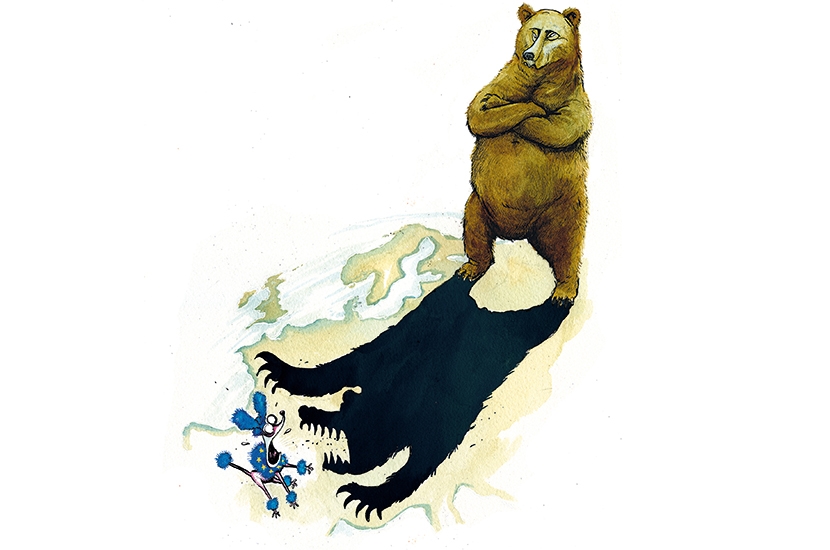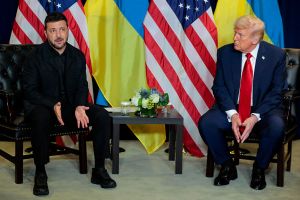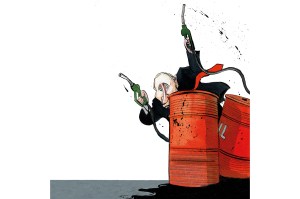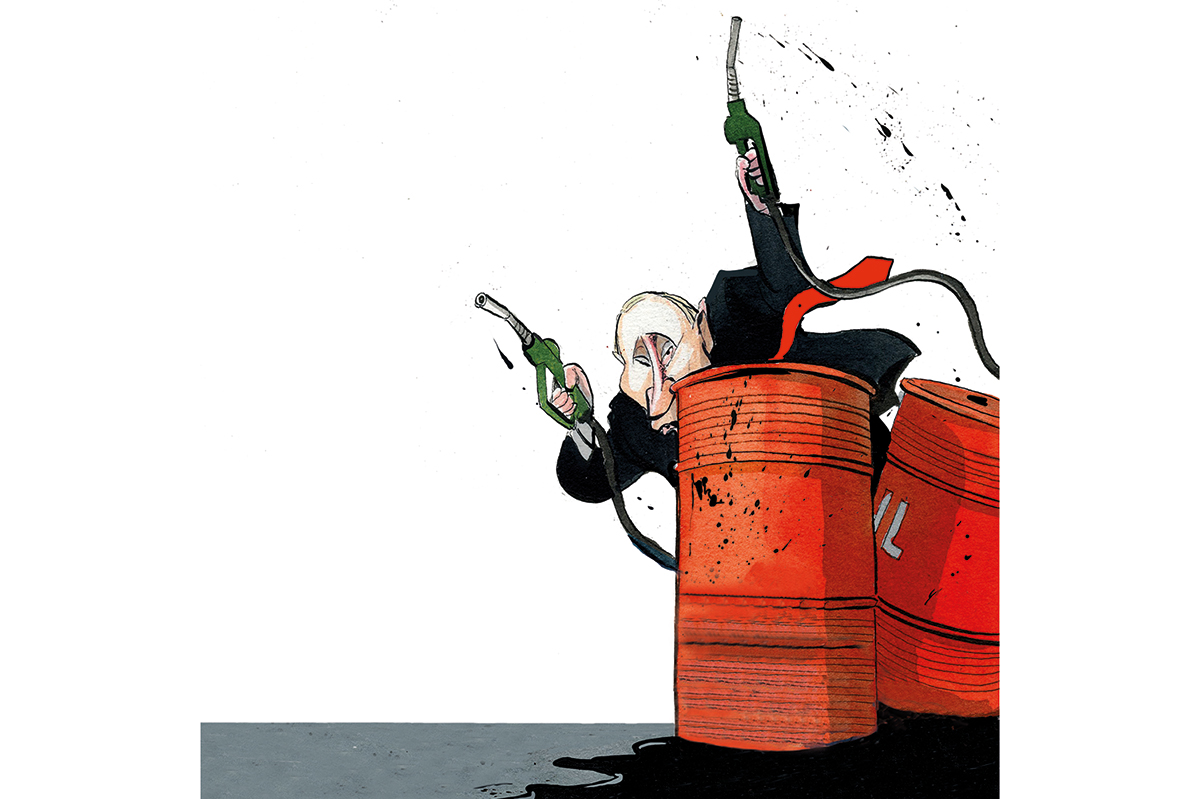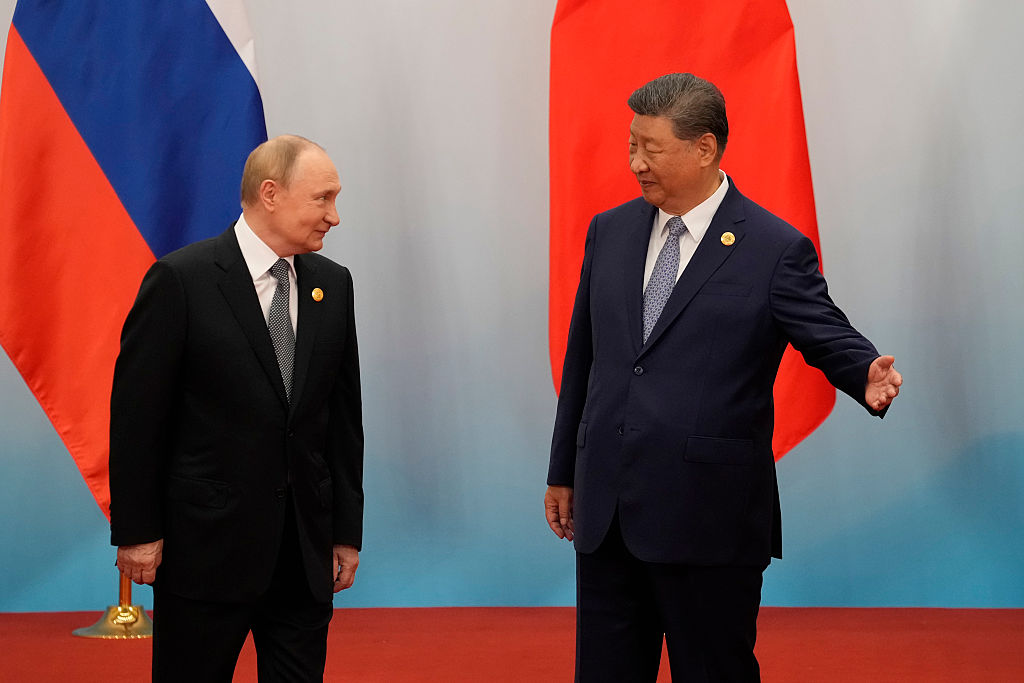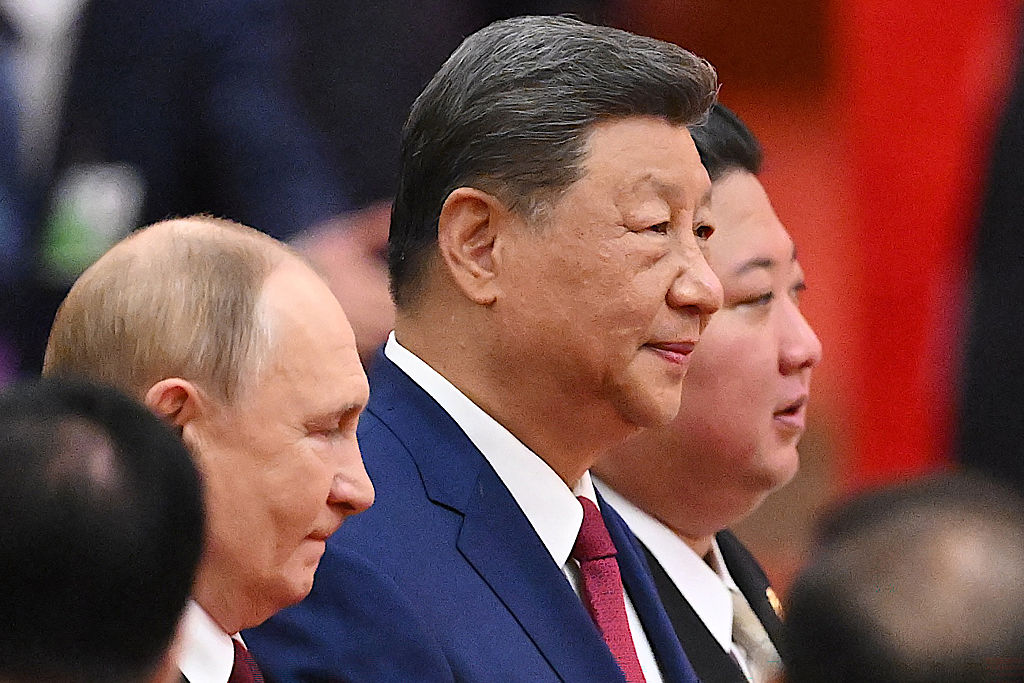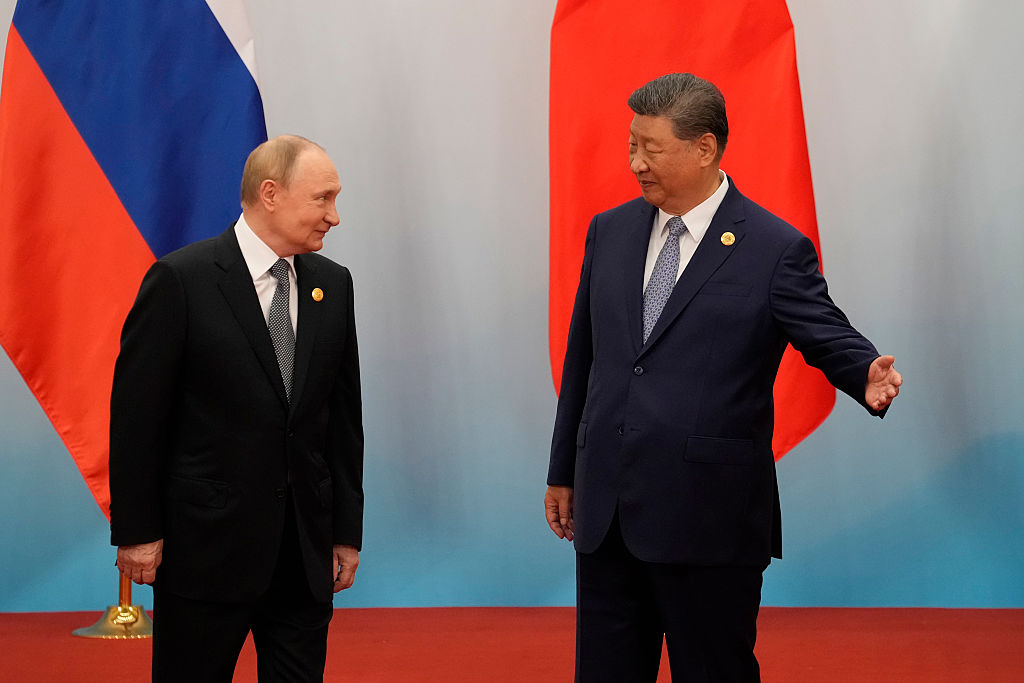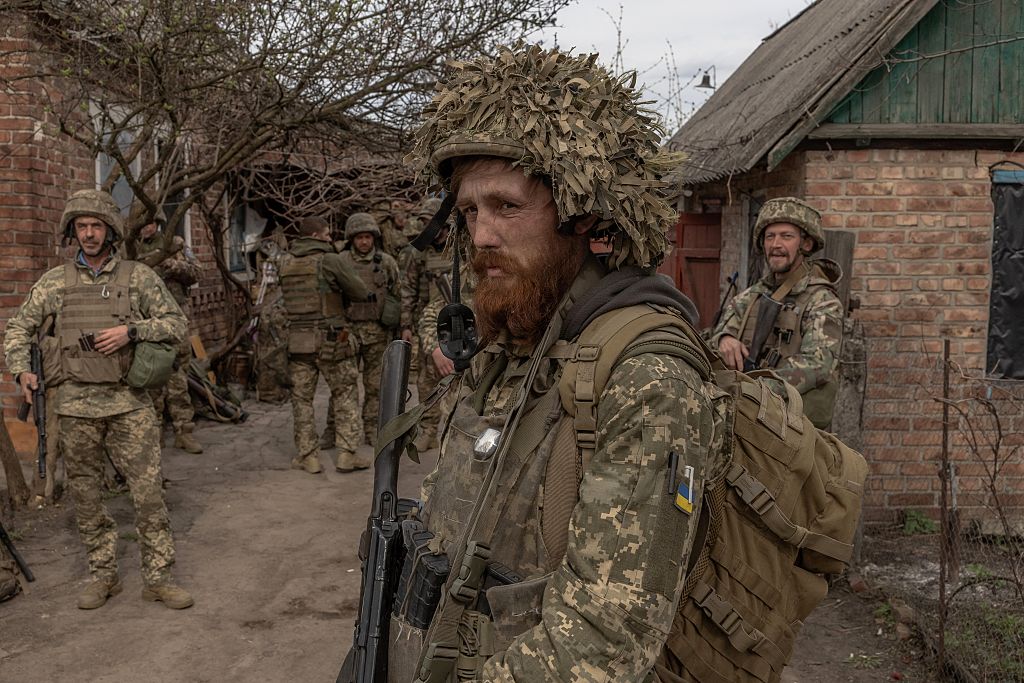An ‘act of aviation piracy’ was how Ryanair boss Michael O’Leary described the forcible grounding of one of his planes in Minsk by Belarusian authorities in order to arrest a dissident who was on board. ‘A shocking assault on civil aviation and an assault on international law,’ said the UK foreign secretary Dominic Raab. The taoiseach Micheál Martin, en route to Brussels for an emergency meeting, called for EU heads of state to deliver a ‘very firm and strong response’ to Belarus’s president Alexander Lukashenko. But what response can the West actually make that will put an end to lawless behavior by Lukashenko — and, more importantly, by his on-and-off ally Vladimir Putin? Where to hit where it really hurts?
The EU’s initial reaction was to begin suspending the license of Belarus’s national airline, Belavia, and to call for a ban on all flights from Europe to Minsk. As an opening shot, that seems at first glance to be reasonably proportional. Except that it’s not Lukashenko or his security chiefs who will suffer. Nearly 60 top Belarusian officials — including Lukashenko himself — have already been personally sanctioned after last summer’s brutal crackdowns on dissent and are already banned from traveling or owning assets in Europe. The Belarusian citizens who will be worst affected by the new flight ban are likely to be the most international and best-educated. Both Lukashenko and Putin currently forbid hundreds of thousands of their own citizens (mostly security service personnel) from traveling to the West, so the EU ban would merely complete the job by insulating ordinary citizens from the corrupting influence of foreign travel.
‘If you really want to punish Luka[shenko], give every young [Belarusian] a plane ticket and a Schengen visa,’ wrote an anonymous user of the Telegram messaging service, where the arrested activist Roman Protasevich worked on two influential news channels. ‘Don’t lock us up in this madhouse!’
Sanctions? The West has been trying that since 2012, starting with individual asset freezes and travel bans for the officials involved in the 2007 murder of the whistleblowing Moscow lawyer Sergei Magnitsky. Since then, Putin’s forces have invaded Crimea; shot down a civilian airliner; hacked the Democratic National Committee and voting machines; and used banned chemical weapons in the assassination attempt on defector Sergei Skripal in Salisbury. Not to mention hacker attacks on key parts of western electrical grid and oil pipeline infrastructure.
For every new outrage, there’s been an answering round of sanctions. The assets of hundreds of Russian officials have been frozen, Russian state-owned companies have been banned from raising international finance, and western companies have been threatened with sanctions if they participate in major Kremlin-backed infrastructure projects such as the Nord Stream 2 gas pipeline. None has changed Putin’s behavior one jot. And such measures are equally unlikely to work on Lukashenko (who has, for the record, been condemned for the ‘irresponsible’ plane hijacking by Kremlin-controlled Russian media). On the contrary, sanctions have allowed Putin to blame Russia’s problems on hostile foreigners and pose as the motherland’s defender against foreign aggression.
When the Russian ruble fell by more than 50 percent in the wake of the Crimea invasion in 2014 (driven largely by falling oil prices rather than by sanctions), Putin responded by banning the import of all EU foodstuffs, kick-starting domestic production and insulating his people from the collapsing hard-currency purchasing power of their money.
As the EU and UK put the squeeze on foreign assets owned by top Kremlin officials, Putin announced an amnesty for all cash held abroad by the Russian elite. This ‘de-offshorization’ helps Putin by keeping his cronies’ cash close — and vulnerable. More, being under US sanctions has become something of a badge of honor among Russia’s elite. ‘What, you’re still able to travel?’ joshed a Russian parliamentarian to a colleague at a dacha party outside Moscow I attended last November. ‘What kind of patriot are you, man?’
Dominic Raab, while still a backbencher, was one of the most prominent advocates of the UK’s Unexplained Wealth Orders, a legally radical measure that effectively reverses the common-law burden of proof and forces individuals to prove that their assets were legally acquired. The idea was to reverse London’s status as repository of choice for billions stolen by kleptocrats around the world. But though hundreds of UWOs have been issued against Russians since 2018, so far no prominent Kremlin-connected figure has seen significant assets seized. ‘They’ve got good accountants, that’s the long and short of it,’ explains one former White House official who worked with Barack Obama on personal sanctions in 2012. ‘They’re not just one step ahead of Treasury… They’re like, 50.’
And while a large number of the children of the Kremlin inner circle — including, for a time, the daughters of Putin and of his press secretary Dmitry Peskov — live in the West, the idea of imposing collective punishment on family members is ethically troubling. So even as a growing list of named individuals are banned from traveling to the West, their spouses, children, family members and money continue to circulate freely. Personal sanctions don’t work any better than economic ones.
Most crucially, the West has allowed a fatal confusion to creep into their sanctions message. Some sanctions have been for behavior that’s plainly criminal — such as the downing of Malaysian Airlines flight MH17 by a Russian Buk missile in 2014, or the Skripal poisoning. Others have been for incidents still not conclusively proven to be the Kremlin’s direct work — such as 2020 election interference and the recent attack by a mysterious hacker group called DarkSide that shut down the Colonial Pipeline system. And a few rounds of sanctions have been for actions that could reasonably be deemed internal matters — such as Lukashenko’s brutal suppression of pro-democracy campaigners. That sliding scale of causality has allowed Russian and Belarusian propagandists to write off all sanctions as unwarranted interference in their countries’ politics.
‘Neither China nor Russia could be clearer in their refusal to allow western interference in what they regard as their internal affairs,’ argues Sir Anthony Brenton, British ambassador to Moscow during Putin’s first term. ‘Sanctions have become a sort of modern bear-baiting; they simply boost the anger and defiance of the bear, while offering the satisfaction and public acclamation of inflicting pain.’
So what will work? Russia, though economically smaller than South Korea, is still tied to the international finance and banking systems. If he wanted to, President Joe Biden could cut off the trade in Russian treasury bills and the publicly traded assets of Russian state companies like Rosneft oil. That would cause immediate and catastrophic economic pain, forcing Putin to seek debt financing from China with all the attendant strategic dependence that would bring. The SWIFT international bank-clearing system is based in Belgium. Cutting off Russian commercial banks would immediately crash inter-bank trade. Millions of Russian Visa cards (headquarters: Foster City, California) and Mastercards (Purchase, New York) could be rendered immediately useless. Even Russia’s internet domain — .ru — is controlled by the Internet Corporation for Assigned Names and Numbers, or ICANN, an American non-profit organization based in California. Last but not least, the European Union is by far the largest consumer of Russian natural gas that provides some 25 percent of Putin’s budget.
But would crashing Russia’s banking system, cutting off all its ties with international finance and sources of revenue, and isolating it from the worldwide web punish Putin? Or would it instead drive him into a desperate corner and unite ordinary people behind their leader?
There’s another problem too: who actually ordered the poisonings, hackings and grounding of the Ryanair flight? It’s easy to use ‘Putin’ or ‘Lukashenko’ as a shorthand. But in reality these egregious actions result from the shenanigans of security services (in the case of Belarus, nostalgically still called the KGB). Sanctions are supposedly directed at changing leaders’ policy. But what if the leaders are not fully in control of the security services that act in their name?
Both Biden and Europe have chosen to keep both carrot and stick in play. In 2019, in the wake of the Skripal attack, the Trump administration signaled that Russian treasury bills could be targeted by introducing restrictions on Americans trading in them — a signal that Biden, in his last round of hacking-related sanctions, re-stated while forbearing to actually turn the screw. Angela Merkel has consistently refused to accede to US demands to shut down the Russian-funded Nord Stream 2 pipeline under the Baltic, scheduled to start pumping gas direct to Germany later this year. But attitudes are changing even among the traditionally ‘Putin-understanding’ German elite — not least after the Kremlin critic Alexei Navalny spent a month recovering from Novichok poisoning in a Berlin hospital and was visited by Merkel.
Putin and Lukashenko, meanwhile, have managed to tread a fine line — behaving at times like the leaders of rogue states, while still maintaining just enough international credibility to keep, for instance, a future summit with Biden on the cards. Both are banking on the fact that the West has too much to lose from open confrontation. The West, for its part, continues to hope that rising economic expectations will fuel pressure for freedom and change among the youth of Russia and Belarus — and are reluctant to extinguish those hopes by crushing their economies and unleashing an ugly nationalist backlash. It’s a delicate balance, and every act of poisoning, hacking and international piracy brings this latest season of detente perilously closer to crashing down into a fully fledged new Cold War.
This article was originally published in The Spectator’s UK magazine. Subscribe to the World edition here.



